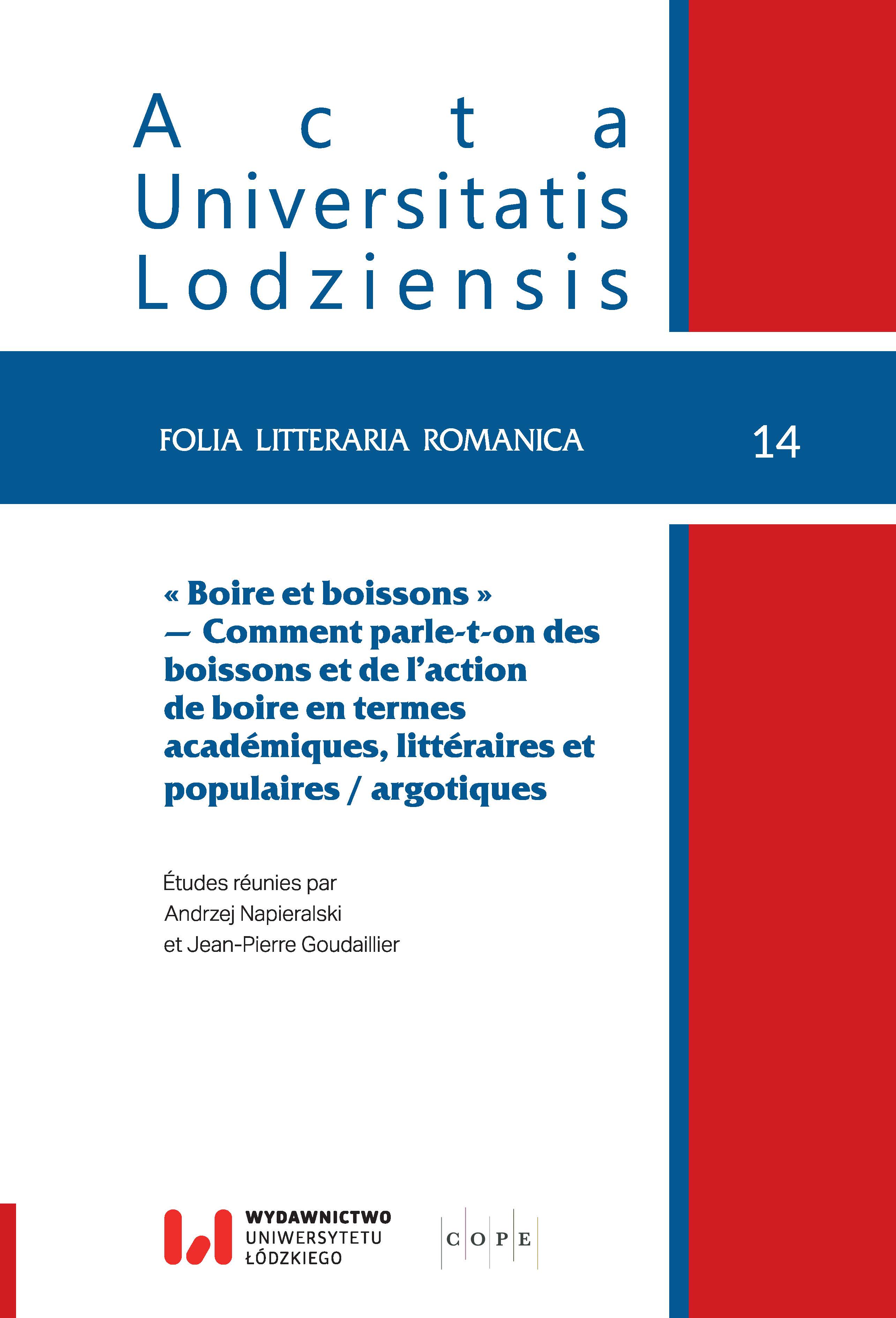Gloria, canon, quand est-ce and poteau télégraphique: Alcoholic Beverages and the Action of Drinking in the Language of the Sublimes
DOI:
https://doi.org/10.18778/1505-9065.14.02Keywords:
Sublimes, working-class language, 19th century, argot, alcoholAbstract
At first glance, it may seem surprising that Denis Poulot’s book, titled Question sociale. Le Sublime ou le travailleur tel qu’il est en 1870, et ce qu’il peut être (1870), can be taken into consideration for an argot analysis. However, social historians perceive this author’s work as a valuable testimony to the literature on the French working-class life in the 19th century. Against this background, the academic interest in Poulot’s work has so far focused only on the life and working conditions of workers and not on the language of the so-called sublimes. A linguistic study of the sublimes (Hardy 2015) has already shown that it is worth investigating certain concepts, their meanings, and etymologies. First, this article introduces Denis Poulot and his work. Subsequently, the language of the sublimes is examined from a linguistic point of view. Here, the focus is on semantic fields, in particular the field of alcoholic beverages, wine merchants, and the action of drinking.
Downloads
References
Bauche, Henri, Le Langage populaire, Paris, Payot, 1951
Google Scholar
Caradec, François, Pouy, Jean-Bernard, Dictionnaire du français argotique et populaire, Paris, Larousse, 2009
Google Scholar
Cellard, Jacques, Rey, Alain, Dictionnaire du français non conventionnel, Paris, Hachette, 1991
Google Scholar
Colin, Jean-Paul, Mével, Jean-Pierre, Leclère, Christian, Dictionnaire de l’argot et du français populaire, Paris, Larousse, 2010
Google Scholar
Cottereau, Alain, « Étude préalable : Vie quotidienne et résistance ouvrière à Paris en 1870 » in Question sociale. Le Sublime ou le travailleur tel qu’il est en 1870, et ce qu’il peut être, D. Poulot, Paris, François Maspéro, 1980, p. 7-102
Google Scholar
D’Hautel, Charles-Louis, Dictionnaire du bas-langage ou des Manières de parler usitées parmi le peuple, t. 1, Paris, de l’imprimerie de L. Haussmann, D’Hautel, F. Schoell, 1808
Google Scholar
Esnault, Gaston, Dictionnaire historique des argots français, Paris, 1965
Google Scholar
FEW en ligne = Französisches Etymologisches Wörterbuch, Walther von Wartburg, https://apps.atilf.fr/lecteurFEW/
Google Scholar
Hardy, Stéphane, « Die Sprache der sublimes im Paris des 19. Jahrhunderts » in Geheimsprachen unter besonderer Berücksichtigung der Romania, éds. S. Hardy, S. Herling, K. Siewert, Hamburg [et al.], Geheimsprachen Verlag, 2015, p. 137-161
Google Scholar
Larchey, Lorédan, Dictionnaire historique d’argot, 9e éd., Paris, E. Dentu, 1881
Google Scholar
Larousse, Pierre, Grand dictionnaire universel du XIXe siècle, t. 8, Paris, Larousse, 1872
Google Scholar
Lécuyer, Bernard-Pierre, « Poulot Denis, Question sociale. Le Sublime ou le travailleur parisien tel qu’il est en 1870, et ce qu’il peut être », Revue française de sociologie, 1981, 22-4, p. 629-635
Google Scholar
DOI: https://doi.org/10.2307/3320817
Le Littré, Le Dictionnaire de référence de la langue française, t. 18, Paris, Le Figaro, 2007
Google Scholar
Michel, Francisque, Études de philologie comparée sur l’argot et sur les idiomes analogues parlés en Europe et en Asie, Paris, Librairie de Firmin Didot frères, fils et Cie, 1856
Google Scholar
Nisard, Charles, De quelques parisianismes populaires et autres locutions non encore ou plus ou moins imparfaitement expliquées des XVIIe, XVIIIe et XIXe siècles, Paris, Maisonneuve & Cie, 1876
Google Scholar
Noll, Volker, Die fremdsprachlichen Elemente im französischen Argot, Frankfurt a. M. [et al.], Peter Lang, 1991
Google Scholar
Poulot, Denis, « Notices nécrologiques », Bulletin administratif de la Société des anciens Élèves des Écoles nationales d’Arts et Métiers, 1905, no 4, p. 325-335
Google Scholar
Poulot, Denis, Question sociale. Le Sublime ou le travailleur parisien tel qu’il est en 1870, et ce qu’il peut être, Paris, Librairie internationale, A. Lacroix, Verboeckhoven et Cie, 1870
Google Scholar
Sainéan, Lazare, Le Langage parisien au XIXe siècle, Paris, E. de Boccard, 1920
Google Scholar
TLFi = Trésor de la Langue Française informatisé http://atilf.atilf.fr
Google Scholar
Downloads
Published
How to Cite
Issue
Section
License

This work is licensed under a Creative Commons Attribution-NonCommercial-NoDerivatives 4.0 International License.













